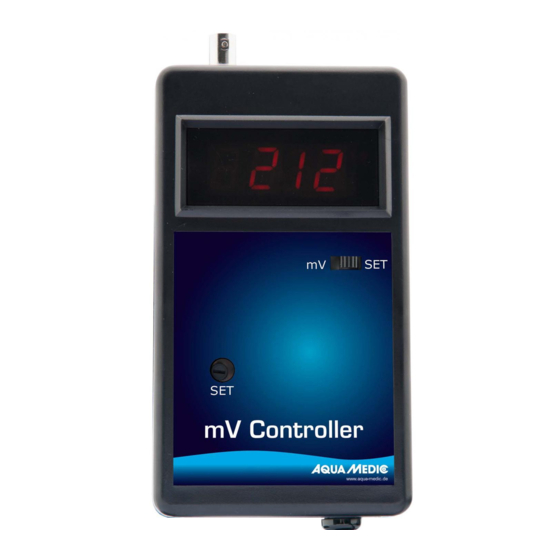Aqua Medic 200.05 01573 Manual de instrucciones - Página 4
Navegue en línea o descargue pdf Manual de instrucciones para Controlador Aqua Medic 200.05 01573. Aqua Medic 200.05 01573 15 páginas.

With the purchase of this digital redox potential controller, you have decided to work with a quality instrument.
It has been especially developed for aquarium use.
With this instrument, you are able to measure and control the redox potential of your aquarium continuously.
1.
Theory
The redox potential or oxidation-reduction potential (ORP) is an electric value that is a parameter for oxidation
and reduction process in the water. The redox potential is of special interest in the aquarium:
To check the water quality in a saltwater aquarium. The ideal range is between 300 and 400 mV. It can be
•
raised to the desired value by injecting ozone into the protein skimmer. The higher the values are, the higher
the percentage of oxidation is – the „cleaner" the water is.
To control anaerobic denitrifying filters. Here, the redox potential is used to check the activity. The ideal
•
range for these filters is between -50 and -100 mV.
The redox potential is also used as a control parameter in other processes. In swimming pools, the chlorination
can be controlled by the redox potential. The minimum value for disinfection is +700 mV.
2.
Delivery
The Aqua Medic mV controller has to be supplied with a redox electrode. We recommend to use the
maintenance-free electrode of Aqua Medic. The ozonizer can be connected to the main plug.
1. Display
2. Indication socket on / off
3. Changeover switch measuring – SET
3.
Starting
1. Connect the main plug to 100 - 240 V, if not indicated otherwise.
2. Connect the mV electrode (at 5).
3. Switch (3) to „mV" (measuring).
The redox potential controller needs no additional calibration. However, it takes about 24 hours until the value
shown in the display is constant. If used constantly, the electrode should be immersed all the time.
4
Operation Manual ENG
4. Set point adjustion (SET)
5. Connection for electrode (BNC)
6. Power supply and socket (no pict.)
